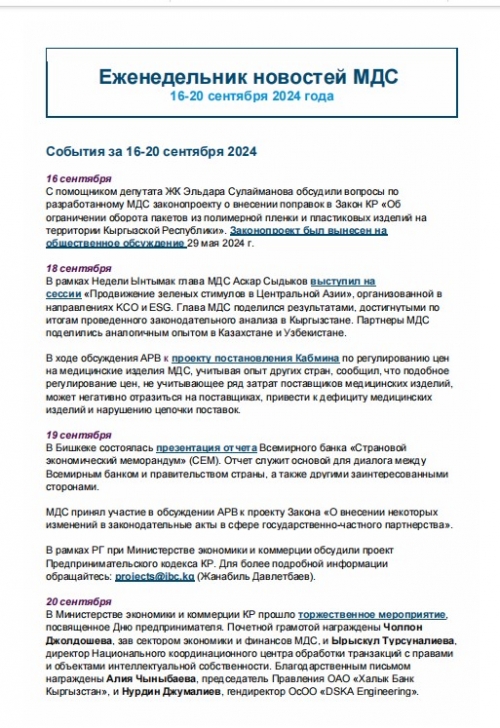News /
IBC news /
Law regulating remote work in Kyrgyzstan comes into force
On January 11, 2023, the Law of the Kyrgyz Republic dated December 23, 2022 No. 123 "On Amendments to the Labor Code of the Kyrgyz Republic" came into force.
The law introduces the concept of remote work. According to an employment contract, the parties can discuss working conditions, labor protection, working hours and rest time (as part of the requirements of the Labor Code of the Kyrgyz Republic), as well as compensation for the use of employees' own equipment.
“The issue of adopting the rules governing remote work has been discussed by the International Business Council since 2019 and has been repeatedly raised at various public-private dialogue platforms,” said Askar Sydykov, IBC Executive Director.

Due to the COVID-19 pandemic, there was an urgent need to regulate the remote work of various categories of workers. Moreover, in recent years, digital technologies have been rapidly developing in Kyrgyzstan, and the state policy is aimed at digitalizing all the processes in the country. Meanwhile, the current labor legislation did not adequately regulate remote work, which could lead to legal conflicts.
The IBC Committee on Human Resource Management, within the framework of a working group under the Labor Ministry, at the beginning of 2020, developed new norms in labor legislation aimed at regulating the work of remote workers.
In May 2020, the Labor Ministry submitted for public discussion the draft law “On Amendments to the Labor Code of the Kyrgyz Republic”, developed in order to regulate the remote work of employees. The bill was revised several times.
Finally, on November 16, 2022, the bill was adopted by the Jogorku Kenesh, signed by the President of the Kyrgyz Republic and published on December 23, and entered into force on January 11, 2023.
The workplace of a remote worker is no longer indicated, and the interaction between the employer and the employee is carried out using information and telecommunication technologies.
“It is important that a norm is being introduced according to which an employment contract can be concluded in the form of an electronic document certified by an electronic signature (electronic employment contract). This will simplify not only the hiring of workers during restrictive measures by the state, but also the hiring of people with limited mobility, residents of hard-to-reach regions and freelancers,” the IBC head explained.
Employees performing remote work are subject to labor legislation and other regulatory legal acts, taking into account the specifics established by the new norms of the Labor Code. For instance, an employee performing remote work is provided with annual paid leave, the conditions are determined by the employment contract.


























